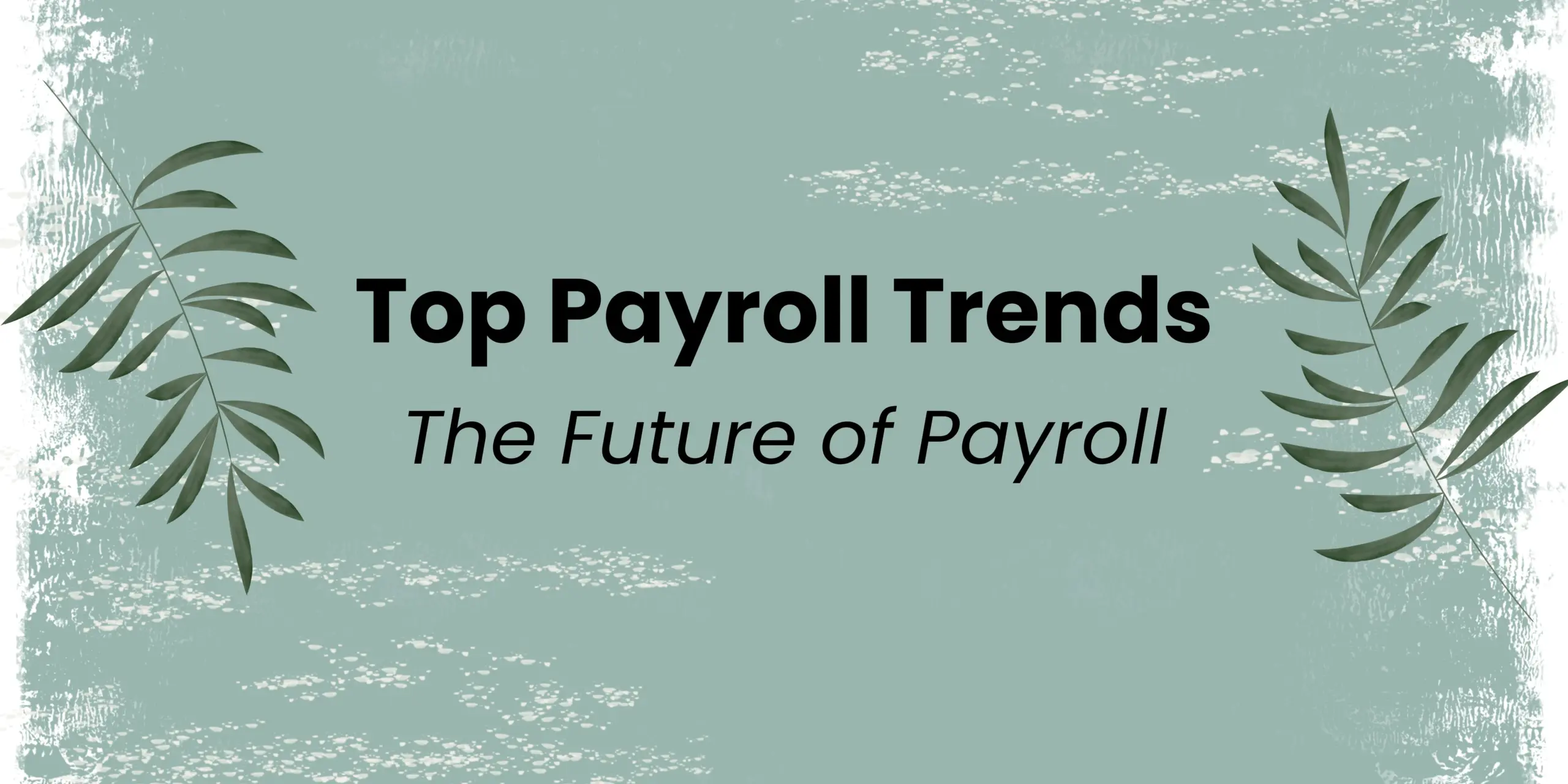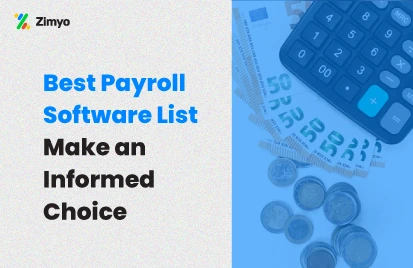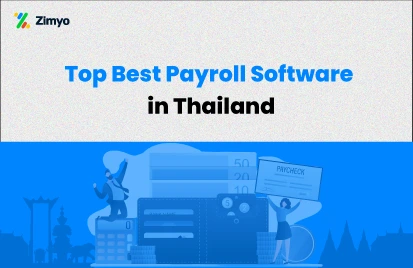Running a small business brings with it its own set of challenges. Being an HR manager among many tasks that need attention, managing payroll undoubtedly stands out as a critical aspect. As the organization grows, so does the complexity of handling payroll processing, tax calculations, and compliances increase. Every day you are already busy juggling a lot of things to keep your workplace running smoothly, and on top of that manually managing payroll can be daunting.
Do you feel like you are drowned in a pile of paperwork, tax, and compliance issues?
Is a lot of your time consumed because of complex payroll tasks?
Don’t worry, here comes the role of payroll software to automate all your processes and ease your burden.
Payroll software helps you manage the end-to-end payroll operations. It manages all your simple and complex tasks. It also helps make your business stay compliant with the tax and labor laws and make accurate tax deductions. You can focus on other major tasks as the payroll processing gets error-free.
How do you Choose the Best Payroll Software for Small Business?

Now that you know how important payroll applications are for small businesses, selecting the right one is also very crucial. As the market is flooded with a lot of options, you are likely to get confused as each claims to provide the best solution. So we have done the work for you and combined all the factors that you can take into consideration to make an informed decision.
1. What are your Organization’s Needs?
Before exploring the options of payroll software, it is very important to understand the needs of your organization first. Start with thoroughly analyzing the requirements of your business. Ask yourself questions such as:
How many employees do you have?
How many do you anticipate hiring in the future?
What is the nature of your business?
Will a basic payroll system be enough for your business or you something more to handle all the complex operations?
What features do you need?
What is the budget you can assign for your payroll?
The answers to these questions can help you make the right decision by eliminating the software that doesn’t meet your organization’s needs. Knowing your specific requirements gives you the foundation to find a payroll solution that is tailored to your unique needs.
2. How Scalable it is?
Small businesses often start with a handful of employees, but the goal is obviously to grow. As your business grows, so will your workforce, and thus your payroll needs will get complex.
Scalability is a critical factor to consider when choosing payroll services for your small business. It refers to the ability of the software to adapt and grow alongside your business and manage evolving payroll needs. Consider the growth of your organization in the future and ask yourself some questions like:
Will the software be able to scale with your increasing workforce?
Will it adapt to the changing needs of your business?
These are some of the questions, whose answers can help you choose the payroll software for your small business. Look for software that can accommodate advanced payroll functionalities, such as handling different types of compensation, benefits, and deductions.
Scalability is crucial to prevent the need to switch software down the line when the business evolves. Choosing a scalable payroll option minimizes the disruptions and complexities that can arise with the expansion of your small business.
3. How user-friendly is the interface?
Managing the payroll system of a small business you understand the importance of time as there is also an old saying ‘Time is money’. A user-friendly interface can streamline your payroll possess and reduce any chances of errors. Thus it can save your valuable time so that you can focus on other important tasks.
Look for software that is easy to navigate and its setup process is intuitive so that it is helpful for you. If the software is easy to use it will empower you rather than adding a new component to your workload.
4. What Features Do They Offer?
Now that you have understood the needs of your organization the next step is to look into the features of different payroll software that provide service to small businesses. Then choose the software that meets all your requirements.
You may look for some of the basic features like:
Automate your Payroll Processing: This feature will assist you in greatly reducing the time and effort needed to complete payroll, resulting in a seamless procedure.
Adherence to Tax Compliance: This feature helps you stay informed about the most recent tax rules and regulations as they are subjected to regular changes. This helps in error-free processing.
Employee Self-Service: This feature will lessen your administrative workload and increase employee satisfaction by enabling your employees to view their tax forms or other payroll-related information.
Reporting and Analytics: It will be easier for you to track costs, get insightful analyses of your payroll data, and ultimately make wise decisions if you have access to all configurable reports and analytics in one location.
Simplify your Payroll Complexities!
5. Does it fit in your Budget?
When it comes to a small business, budget is always a big concern. You have realized by now how payroll software can ease your workload by automating all the payroll processes for you but it comes with a cost that may shake up your finance.
As you have already decided on the needs of your organization and the features, the next step is to set up a budget. Then look for the software that matches your organization’s needs and the budget range. Also, enquire the sales team of the vendors for any hidden costs.
Select a few that match all your requirements and then conduct a thorough cost-benefit analysis. Look for things like time and resources saved, reduction in manual errors, and the potential for improved compliance.
While cost is a crucial factor, payroll software can be a strategic investment as it can give a good return on investment for your small business.
6. What are its integration capabilities?
The payroll system is not something that will work in isolation. It should integrate with other essential business software like HR, recruitment, etc. for an enhanced experience. Look for answers to questions like:
Is the software compatible with your other tools?
Can it streamline your workflow by sharing data across different platforms?
If the software is well aligned with other tools, it will help speed up the payroll running process and also close your motley books. Integration features minimize manual data entry and guarantee data consistency throughout the organization by enabling data synchronization and payroll automation procedures across several systems.
7. How seamlessly it can manage compliances?
The tax and legal laws keep on changing and to keep up with it you need to keep track of the changes. Thus navigating the complexes of tax regulations becomes a crucial factor of payroll management. You can look for answers to some of the questions like:
Does the payroll software keep up with the ever-changing tax laws?
Can it generate necessary tax filing reports?
Using automated payroll software instead of human payroll processing can prevent legal problems and financial losses due to noncompliance with regulations. It can also quickly correct any calculation errors that may occur.
Select payroll software that can easily incorporate updates to compliance into its computations and reporting.
8. How Secure your data will be?
Payroll data is highly sensitive as it has personal and financial data, thus it requires great security measures. The payroll software that has a strong data security framework safeguards your information against any potential breaches or unauthorized access, thus instilling confidence in both employees and employers.
The right HR and payroll software for small businesses should have features including data encryption, role-based access controls, and regular security audits. This thus protects confidential information and ensures compliance with data privacy regulations.
Small businesses may build trust, reduce risks, and uphold strict privacy standards by giving priority to a payroll software system with these extensive data security capabilities. This will thus eventually preserve the integrity of their employees’ financial and personal information.
9. What are the Feedback and Reviews?
In the era of digital technology, all the information is available at your fingertips. Take the best advantage of it! A payroll software may cost you a lot so it is a good practice to leverage customer feedback and reviews to make an informed decision.
Look for this information on trusted platforms like G2, Capterra, Softwaresuggest, etc. Here organizations share their actual user experiences and thus are reliable. Look for information like
What are other small business owners saying about the payroll software?
What are the pros and cons mentioned for the software?
You can also have a one-on-one conversation with them to know their real-time experiences. These feedbacks and testimonials provide valuable insights into the software’s performance, reliability, and suitability for your business.
10. How is the after-purchase Customer Support?
The right vendor is not the one who just focuses on the sales but focuses on after-service. What if you get issues while working on it?
Imagine encountering such an issue on the payday and that too without any customer support. Thus having responsive customer support is of utmost importance.
Look for answers to the questions like:
Can you reach the support team easily via any medium like phone, email, or live chat?
Do they offer timely responses?
A payroll software provider with reliable customer support ensures prompt resolution of issues, thus minimizing disruptions to payroll processes.
Conclusion
As per the Forbes report 33.3 million businesses in the United States qualify as small businesses, which makes up 99.9% which is definitely a lot. Thus its important to look for the right payroll software for the small business. And choosing the right payroll software for your small business requires an analysis of all the above factors to make an informed decision. By conducting a thorough analysis and weighing your options, you can select a payroll solution that serves as a reliable partner for your organization. So, ask the right questions, weigh your options, and set your business up for success.
Out of all the options available in the market, Zimyo is the one that has emerged as a proven leader in the payroll processing industry. It provides all the features with its 40+ cloud-based modules. This top-tier, global platform offers HR professionals a smooth way to handle the challenges of processing payroll monthly. With just five clicks, the software’s sophisticated capabilities and user-friendly interface guarantee error-free payroll management, allowing businesses to concentrate on their strategic goals while Zimyo takes care of the rest.
So if you are managing a small business and also expanding, Zimyo will be there with you hand in hand to automate all your processes Schedule a demo with Zimyo for innovation, excellence, and success in HR and payroll management. You can also look for top payroll software in 2024 for your reference.




